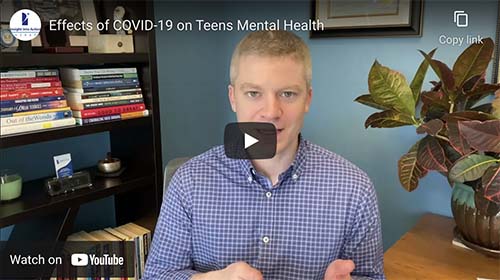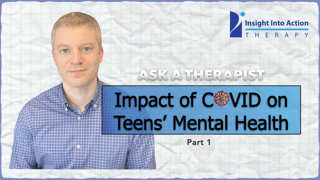Part 1: Why is this affecting teens differently?
Matt Christian, LCSW
We’re now two years (and who knows how many variants) into this pandemic, and it’s been rough on us all. However, just as the risks from Covid itself are different for different age groups, the psychological and social effects have been different as well. While the pandemic has brought so much uncertainty, one thing is clear: many of our young people are struggling. Anxiety, depression, and self-harm are all on the rise. The U.S. Surgeon General has even released an advisory to detail this crisis.
As a therapist who works with many teens and their families, I thought I’d share some observations from the therapist’s office. But first, let’s look at the bigger question: why might this be affecting teens differently in the first place?
One way to approach this question is to look at the developmental stage of adolescence. Some important features of adolescence are:

- Exploring and developing their identity and beliefs,
- Achieving greater independence and re-negotiating roles with their parents
- Developing greater social skills and empathy,
- Navigating their maturing bodies and romantic relationships, and
- A greater ability to imagine and plan for their future.
Importantly, much of this happens through the interaction with peers. I know this isn’t exactly a “hot take” for parents, but peer relationships take on a huge importance in adolescence. The lockdowns, social distancing, school closures, and loss of activities have been tough on them.
And this is the heart of the point I’m making – that due to their developmental stage, extreme isolation is damaging for teens in unique ways.
Now, there are of course many other factors that play a significant role. For example: socioeconomic status, the effect of a parent getting sick or losing their job, or a kid being stuck at home all day with an abusive family member, to name a few.
Indeed, let’s give this some crucial context. The pandemic hasn’t caused a mental health crisis in young people. Rather, there has been a growing crisis for at least a decade, and then COVID came and exacerbated what was already there.
I won’t offer up the trope that “kids are resilient” (which they are), because doing so often feels like a way of avoiding the real need. However, I believe wholeheartedly in teens’ and their family’s ability to heal and flourish, no matter their starting point.
In future videos and blog posts I’ll discuss observations from working with teens during the pandemic and some things we can do to support our teens.
But if your teen is struggling, it can never hurt to reach out to a mental health professional in your community.







